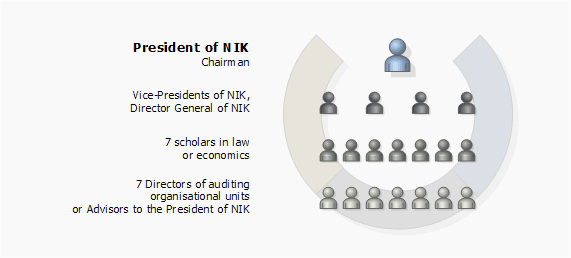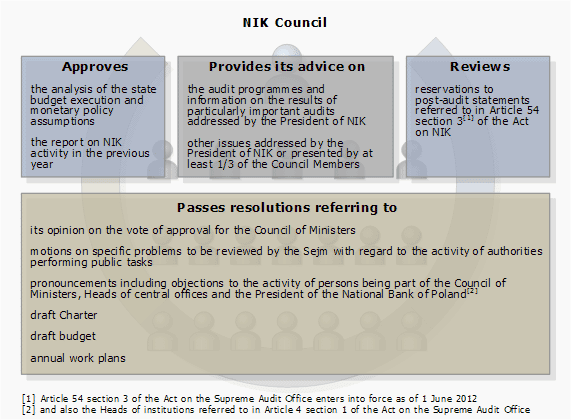Composition and work mode of the NIK Council
The NIK Council comprises: the President of NIK as Chairperson, Vice-Presidents, Director General and 14 Members.
7 scholars of law or economics and 7 Directors of auditing organisational units or Advisors to the President of NIK are appointed Members of the NIK Council by the Marshal of the Sejm upon request of the President of NIK after obtaining opinion of the relevant Sejm Committee. The term of office of a Member of the NIK Council is 3 years.

Fig. 1. The NIK Council composition chart
The persons being part of the Council are independent in performing their functions and may have dissenting opinions on the resolutions voted upon. The guarantee of the Members’ independence, in particular when they are appointed on part of NIK, is the secret ballot as well as the fact that the employment agreement termination with an appointed employee being Member of the NIK Council requires consent of the NIK Council.
The President of NIK may invite persons other than the Council Members to the Council meetings.
Meetings of the NIK Council are convened by the President of NIK on his or her own initiative or upon request of at least 1/3 of the Council Members. The meetings are chaired by the President of NIK or a Vice-President appointed by him or her. In 2010, 15 Council meetings were held, of which one was of seminar nature. The seminar meetings are the place of debate on crucial issues of the state functioning and the role of NIK in constructing the state under the rule of law. They are attended by representatives of the Sejm, Senate, public administration and scholars.
Powers of the Council
The Council of NIK has broad powers. This body adopts resolutions referring to annual work plans of the Supreme Audit Office, its draft Charter as well as the draft budget. Every year the Council approves the documents that NIK is obliged to file with the Sejm, i.e. The analysis of the state budget execution and the monetary policy assumptions and The report on NIK activity for the previous year. Besides, the Council passes its opinion on the vote of approval for the Council of Ministers and motions on specific problems to be reviewed by the Sejm with regard to the activity of public authorities. Any pronouncements including objections to the activity of Members of the Council of Ministers, Heads of central offices, the President of the National Bank of Poland and persons in chargé of the institutions referred to in Article 4 section 1 of the Act on the Supreme Audit Office also require resolutions of the NIK Council.
The Council of NIK may also provide its advice on the audit programmes as well as information on the results of particularly important audits addressed by the President of NIK. Any other issue addressed by the President of NIK or presented by at least 1/3 of the Council Members is subject to advice. The Council of NIK also reviews reservations to post-audit statements, referred to in Article 54 section 3 of the Act on the Supreme Audit Office.

Fig. 2. Powers of the Council of the Supreme Audit Office
The tasks of the NIK Council also includes reviewing reservations to the assessments, comments and findings included in the post-audit statements submitted by the President or Vice-Presidents of NIK.

